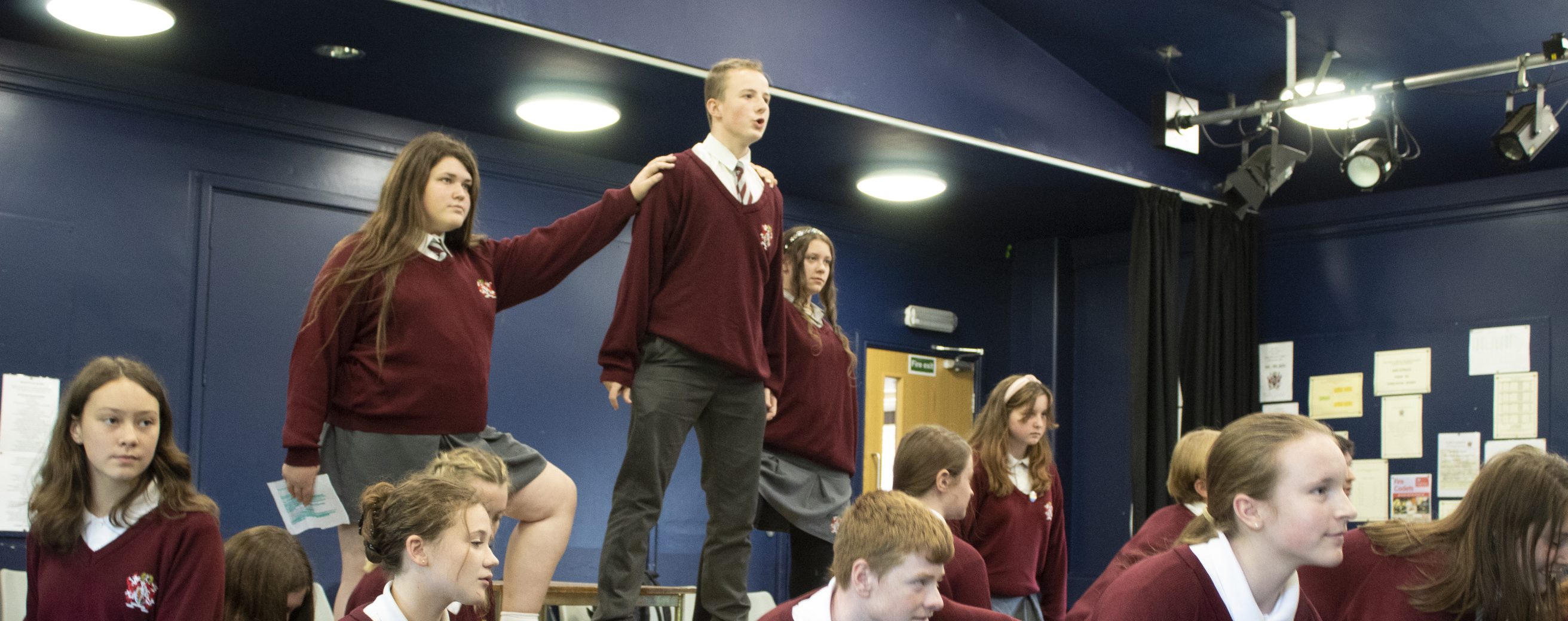
Drama
In line with our whole school curriculum statement, Saint Aidan’s is a Church of England High School with an inclusive Christian ethos. The Drama department vision is:
To provide every student with the chance to progress and then pursue excellence within Drama
To do this, the department will facilitate every student with the means to develop their talents fully, through the quality delivery of fully trained and motivated staff, of a broad curriculum and extra-curricular activities
The students will be given the opportunity to display these achievements in a variety of stages increasing their feelings of self-worth
The formal Drama curriculum
Aims: Through the teaching of drama at Saint Aidan’s we aim:
- to enable all students to explore a variety of theatrical genres
- to encourage each student to gain in confidence and self-esteem through an engagement with dramatic arts
- to explore issues and themes relating to the wider world through dramatic exploration
- to develop everyone’s artistic skills and creativity
- to promote social interaction, teamwork, and communication
- to allow students to recognise their own creative potential
Objectives: By the end of their drama education at Saint Aidan’s all students should be able:
- to use the skills and techniques they learn in a creative manner and disciplined manner
- to be able to create believable characters using a variety of techniques
- to empathise with the situations the characters they create, and play find themselves in
- to reflect on the role of drama theatre as a mirror to life
- to think and act as artists working creatively and intelligently
- to analyse and evaluate their own work, and that of others
Key Stage 3
Our Key Stage 3 curriculum contributes to the schools’ aim of providing each student with an experience that is both broad and balanced. It helps children think about the ‘who, why, where, and when’ elements of stories, events, and everyday experiences. Drama helps children develop a creative perspective on life and gives them freedom of expression.
At KS3 the focus is on acquiring the skills necessary to create good quality work. The work is often intense and very challenging as students find themselves working in a ‘foreign environment’. Students learn fundamental skills whilst at the same time engaging with a range of subject matter including devising work, scripted work, improvisation and a variety of theatrical forms.
A students own personal imagination is also a key element to creating a successful drama performance. A fertile imagination is essential to any performer if they are to become a different character and understand how that character might respond to certain situations.
In our drama lessons we also must consider ‘staging’. In other words, the requirements needed to bring a drama to the stage. This might include stage sets, lighting, music, costume or even special effects. Staging considers any performance material from an audience perspective, to make it as powerful or effective as possible.
The emphasis is on ‘serious fun’ – practical engaging learning in a safe and stimulating environment. Our curriculum is carefully designed to prepare students for life after secondary school by developing self confidence and self esteem as well as many other interpersonal skills.
In Year 8 students have 2 hours per week on a 10 week rotation.
| Weeks 1-6 | Weeks 7-10 |
| Devising: Non-naturalistic techniques | Physical Theatre: Alice in Wonderland |
In Year 9 students have 1 hour per week.
| June/July | Sept/Oct | Nov/Dec | Jan/Feb | Feb/March | April/May |
| Theatrical Design (Costume & Makeup) | Production skills: Pantomime | Scripted: Teechers | Devising: Theatre in Education | Scripted: DNA | |
Key Stage 4
All Year 10 and 11 students study the Eduqas Level 1/2 Performing Arts Technical Award.
Eduqas Performing Arts Technical Award Homepage
The Vocational Award in Performing Arts has been designed to support learners who want to learn about this sector and the potential it can offer them for their careers or further study. Further study would provide learners with the opportunity to develop a range of specialist and general skills in drama that would support their progression to employment.
The qualification aims to develop learners’ knowledge and understanding of the performing arts sector and provide them with opportunities to develop associated practical skills. Skills covered include performing existing works, creating original works and planning commissioned work.
The course consists entirely of coursework. There is no exam. The three units that make up the qualification focus on applying knowledge, skills and understanding through purposeful tasks that have many of the characteristics of real industry work.
Students study for 2.5 hours per week averaged over the two-year course. The course is equivalent to 1 GCSE.
Here is an overview of the Key Stage 4 Performing Arts curriculum. Please note that units 1 and 2 run concurrently and not linearly throughout Year 10. Unit 1 Performing will also extend into the early part of Year 11. This provides students with the maximum amount of practise and development time for their performances:
Enrichment
Students have many opportunities to experience Drama beyond the classroom. All students see a Christmas production in Year 7. Some opportunities to see live theatre are provided to students in Years 8 & 9. During Years 10 & 11 students are required to watch professional productions for the written exam. Four opportunities to see a variety of productions are provided throughout the Vocational Performing Arts course.
There is a drama club aimed primarily at students in Key Stage 3.
We run school productions every two years and in between offer students the opportunity to display their skills during assemblies and at our ‘Teatime’ Creative Arts concerts.
Department Staff
| Mrs L Marsden | Drama Teacher |
| Mrs L Holloway | Drama Teacher |
Related documents
| Document Name | Document Updated | Document Type |
|---|---|---|
| Eduqas GCSE Drama Specification |
